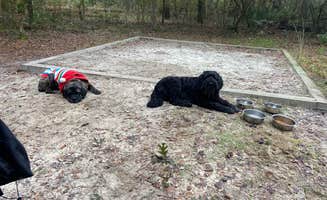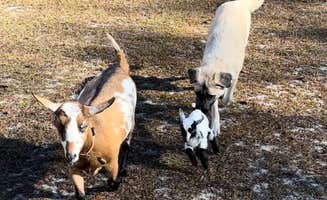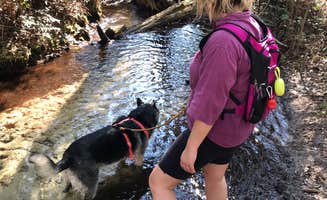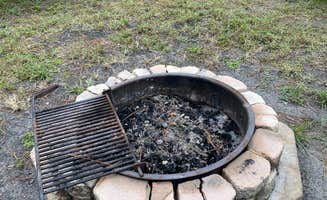Fleming Island sits in the northeastern corner of Clay County, Florida, where the mild climate creates favorable camping conditions year-round, with winter temperatures rarely dropping below 45°F. The area lies near the convergence of Black Creek and the St. Johns River, creating multiple waterway access points for campers. Campgrounds in this region feature diverse terrain from oak hammocks to pine forests.
What to do
Kayaking on Black Creek: Black Creek Ravine Conservation Area offers paddle-in camping opportunities with direct river access. "My family hiked about 2.4 mi in to this campsite and stayed one night. We liked that you have to hike in, there is no car access. It is about 30 feet through some trees to the river," explains Nate D., who visited Black Creek Ravine.
Fishing from docks: Several campgrounds maintain fishing piers recently upgraded for better access. "They recently upgraded and replaced the fishing pier and its awesome," notes Tracy L H. after staying at Camp Chowenwaw Park, where both overnight campers and day visitors can cast lines.
Hiking wooded trails: Explore miles of trails through different ecosystems. "We have stayed here many times. In cabins or in tent. We like to hike which there is plenty of. Canoe which they rent," shares Jenn B. about Mike Roess Gold Head Branch State Park, highlighting the trail system accessible to all camping styles.
Swimming in spring-fed waters: Natural swimming options range from spring-fed pools to ocean beaches. "Green Cove Springs has a pool also in a community park on the St. John's River that is spring fed and would be a cool stop," recommends a Camp Chowenwaw visitor, pointing to additional swimming opportunities beyond campground boundaries.
What campers like
Secluded tent sites: Hammock camping areas offer privacy between sites. "I stopped here to stay overnight on a Thursday as I was passing through. There was only one camper but did not know that until I left the next morning. It was quiet and felt secluded," describes Amber R. after camping at Jennings State Forest Hammock Campground.
Unique accommodations: Beyond standard camping, unique sleeping arrangements appeal to families. "Love this park and the tree house 'cabins'. Great place to stay with the kids," says Chad P. about Camp Chowenwaw Park, referencing the elevated structures that provide a different camping experience.
Dual water access: Some locations offer both freshwater and saltwater recreation options. "Beautiful beach on the Atlantic Ocean, beautiful sunsets along the inter coastal. Full hook ups, cable, most sites private and separated by vegetation also providing shade in the summer," notes Sean A. about North Beach Camp Resort, highlighting the appeal of having two water bodies accessible from one campground.
Diverse wildlife viewing: The local ecosystem supports varied wildlife viewing opportunities. "Lots of hiking and off-rad hiking trails through the greenery. And… just steps to the Atlantic ocean, with dogs welcome on the beach," reports Kathy L. about Kathryn Abbey Hanna Park, emphasizing the biodiversity accessible within short walking distances.
What you should know
Beach pedestrian safety: Crossing roads to reach beaches requires caution. "To get to the ocean you must cross over A1A with traffic speeding up to 50mph. There are no crosswalks or caution signs alerting traffic to pedestrians," warns Brandie B. about North Beach Camp Resort, highlighting important safety information for families with pets.
Seasonal mosquito activity: Bug protection is essential during warmer months. "If you can handle the Florida mosquitos, this will be heaven. It's just a little gravel road walk from your tent to the stocked lake or the Atlantic beach," shares Beth W. about Kathryn Abbey Hanna Park, suggesting that insect presence varies by season.
Site spacing variations: Campground layouts differ significantly in terms of privacy. "The campsites are private and quiet. Lots of shade. Full hookups," reports Martin J. about North Beach Camp Resort, contrasting with more densely arranged sites at other nearby facilities.
Pet policies at beaches: Rules regarding dogs on beaches vary by location. "And… just steps to the Atlantic ocean, with dogs welcome on the beach. We were here in early February and almost no one on the beach," observes Kathy L. about Kathryn Abbey Hanna Park, noting both pet access and seasonal crowd levels.
Tips for camping with families
Pool regulations: Swimming facilities often have specific rules for children. "The only downside was the fact that they are very strict at the pool. The children had to do swim tests and wear a necklace denoting which portion of the pool they could be in," advises Jenn B. about Camp Chowenwaw Park, providing important information for parents planning water activities.
Treehouse camping options: Elevated camping structures appeal specifically to families with children. "The treehouses were so fun to stay in and being higher up gave us chances of a breeze—many in our group brought battery operated fans," recommends Jeanene A. about Camp Chowenwaw Park, offering practical advice about comfort in these unique accommodations.
Equipment transportation: Some sites require carrying gear from parking areas. "It was a good 10 minute hike with our gear to get to the tree houses from parking area near pool. Wagons are provided but pack light to save the trouble," notes Jeanene A., providing logistics information important for families with extensive equipment.
Wildlife education opportunities: Local conservation areas offer learning experiences. "The park has a swimming pool and other places to camp besides the treehouses. There is a fun trail to hike with a wooden bridge over the swamp," describes Sean B., highlighting educational opportunities at Camp Chowenwaw Park.
Tips from RVers
Site accessibility: Some campgrounds have challenging site arrangements. "Site #243 with no neighbors, but a short walk to the bathrooms. The bathrooms are somewhat ghastly. The shower stalls are small, and the water pressure is questionable," reports L O. about Kathryn Abbey Hanna Park, providing specific site recommendations and bathroom information valuable to RVers.
Parking configurations: Tight quarters can create logistical challenges. "She TIGHT boy. I drove a commercial truck for years and I had to switch to back us in because it was so tight. We were asked to move our truck multiple times so other people could pull out or back in," cautions Elizabeth E. about Kathryn Abbey Hanna Park, offering important perspective for larger rigs.
Ground conditions: Soil composition affects stability during wet weather. "The site had trees with tall bushes on both sides providing adequate privacy from other resort guests. All roads throughout the park are compacted sand, we had good traction throughout in both our Class A and MINI Cooper," shares Brandie B. about North Beach Camp Resort, providing useful traction information for varying vehicle types.













